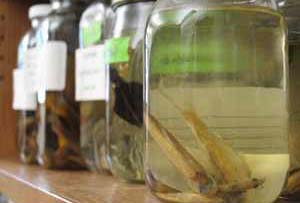Merchants of death go scot free
 Formaldehyde (formalin), used for preserving human bodies and animals in hospital mortuaries and laboratories, is reportedly being used indiscriminately during the holy month of Ramzan for preserving milk, fish, fruit and other perishables, including vegetables.
Formaldehyde (formalin), used for preserving human bodies and animals in hospital mortuaries and laboratories, is reportedly being used indiscriminately during the holy month of Ramzan for preserving milk, fish, fruit and other perishables, including vegetables.
The government has virtually no control over the sale and use of formalin, a chemical dangerous to humans, which is being used liberally by the merchants of death, to extend the shelf life of fish, fruit, milk and other food stuff.
Foods dipped in formalin are harmful to health, and people, after using them over a prolonged period, can develop respiratory and neurological problems, along with cancer, liver cirrhosis, kidney, lung, allergy, asthma and other health hazards, warn health experts.
Chairman of the Bangladesh Council of Scientific and Industrial Research (BCSIR), Prof. Dr AI Mostafa, said that formalin was used for preservation only of animal and human bodies, and their tissues.
The government must formulate a law to prevent the indiscriminate use of this potent poison, Prof. Mostafa suggested.
He said, mobile court magistrates from all corners of the country were taking lessons at the BCSIR on the use of kits that help detect formalin applied on foodstuff, as part of the government’s drive against its use.
Warning against the use and long-term ill-effects of formalin on humans, Dr Mala Khan, a senior scientist at BCSIR, said, “No food item should dipped in formalin to maintain its freshness.”
Abu Tareq Mohammad Abdullah, senior scientific officer of Institute of Food Science and Technology under the BCSIR told The Independent that the National Toxicological Programme (NTP) under the WHO declared formalin as carcinogenic compound in June 2011.
“Formalin can be produced naturally in food like sea fish, but additional should not be used in food intentionally. There is no study across the world regarding use of formalin in food,” he said in reply to a query.
The National Academy of Science (NAS) committee issued an independent review of the draft United States Environmental Protection Agency IRIS assessment of formaldehyde, providing a comprehensive health effects assessment and quantitative estimates of human risks of adverse effects, he said.
Formaldehyde has been banned in cosmetics in both Sweden and Japan considering its dangerous bad effect of skin, Abdullah said.
He further said that eyes are most sensitive to formaldehyde exposure. “The lowest level at which many people can begin to smell formaldehyde is about 0.05ppm and the highest level is 1ppm. The maximum concentration value at the workplace is 0.3ppm. In controlled chamber studies, individuals begin to sense eye irritation at about 0.5ppm, 5 to 20 per cent report eye irritation at 0.5 to 1 ppm and greater certainty for sensory irritation occurred at 1 ppm and above.”
The United States Environment Protection Agency (EPA) allows no more than 16ppb formaldehyde in the air in new buildings constructed for that agency, he said adding that formalin is using indiscriminately in Bangladesh without any restriction.
Lutfor Rahman, director, Bangladesh Standards and Testing Institute (BSTI), told The Independent that they were conducting mobile court drives, every day, against people adulterating food with chemicals other than the permitted preservatives.
“Four mobile courts are conducting their drives in the capital every day. The mobile courts are also operating at the divisional headquarters and in districts. Presence of formalin has been detected in fruits like apples, bananas, grapes, mangoes and even maltas (grape fruits). Besides, presence of formalin was also detected in various types of fish,” he said.
The BSTI director claimed that food adulteration had been brought under control, because of the mobile courts.
Formalin is imported mainly from India, China, Hong Kong, Korea, Iran and the US, commerce ministry sources said.
According to the Bangladesh Bank (BB), import of formalin has drastically declined in the recent years. The BB officials were puzzled to note the fall in its import. They apprehended that either formalin was entering the country through its porous borders, or it is being produced locally.
Tk. 19.04 crores worth of formalin was imported in 2007-08, while only Tk. 73 lakh of formalin was imported in 2009-2010, a BB official said.
Prof. Dr Yakub Ali of the Bangabandhu Sheikh Mujib Medical University said that the import of formalin could not be banned, because of its legal use in thousands of laboratories, including pathological labs and hospital mortuaries.
Answering a question, he said, “It’s not impossible to trade in formalin through illegal means, or producing it locally. Formalin is still being used in various food stuff, which is harmful for health.”
The government could impose restrictions on the import and sales of formalin, he said, adding, “Formalin is also available in the open market, without any restrictions. As a result, a section of unscrupulous traders were mixing formalin with foodstuff.”
Rafiqul Islam, a chemical trader at Mitford, the city’s hub of medicines and chemicals, said, “The sale of formalin has not declined. The demand and supply of formalin is good.”
However, it is not possible to quantify the exact demand for formalin, he said, replying to another question.
A typical commercial grade of formalin may contain 10-12 per cent methanol, in addition to aluminium (3 ppm), iron (1 ppm), and copper (1 ppm).
High doses due to continuous use of it may lead to death. If formalin is used in fish, a favourite daily essential of the Bengalis, it acts slowly in human body. Children are the most vulnerable to its long-term use, experts warn.
The formalin detection kits, available at the BCSIR sales counter in Dhaka, at reasonable prices, could be useful in detecting its presence in fruit, vegetables, fish and milk, they suggest.
Courtesy of The Independent




















